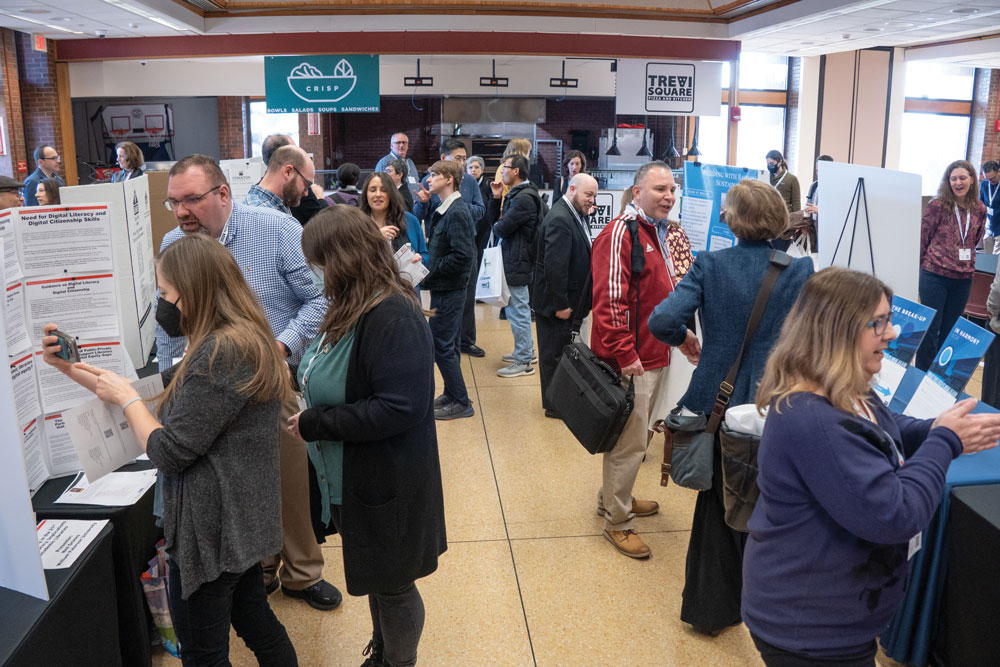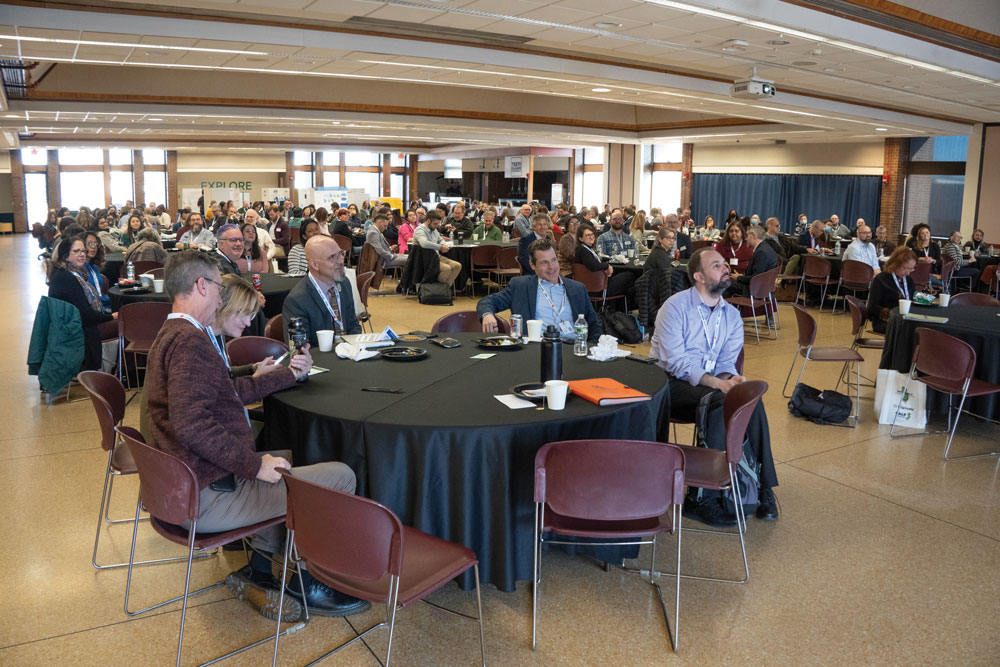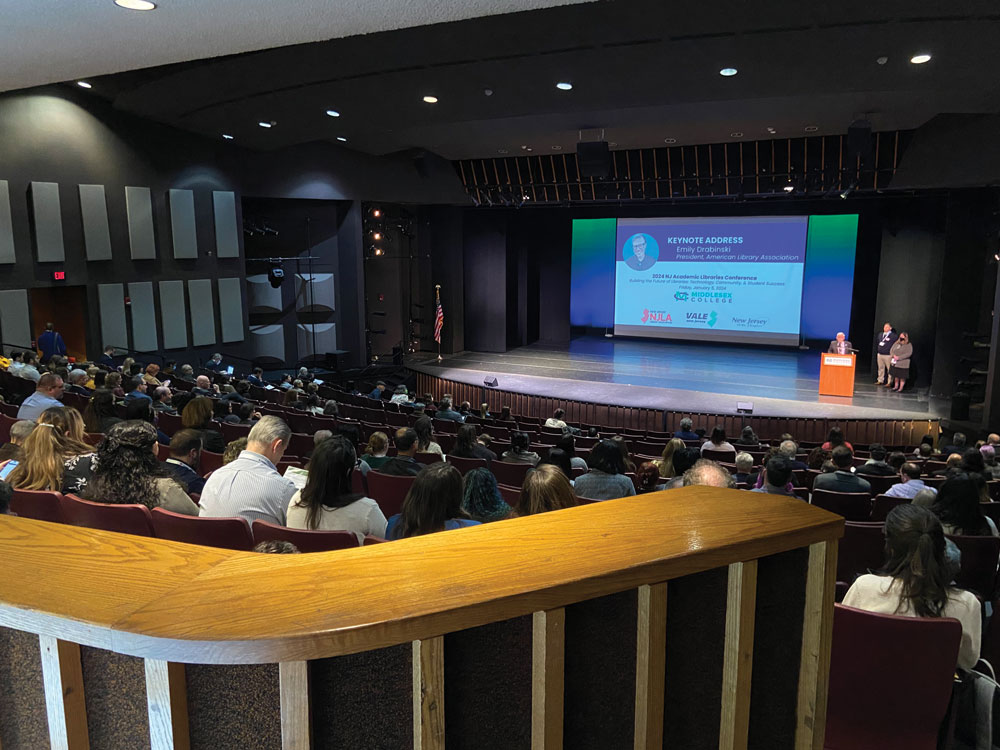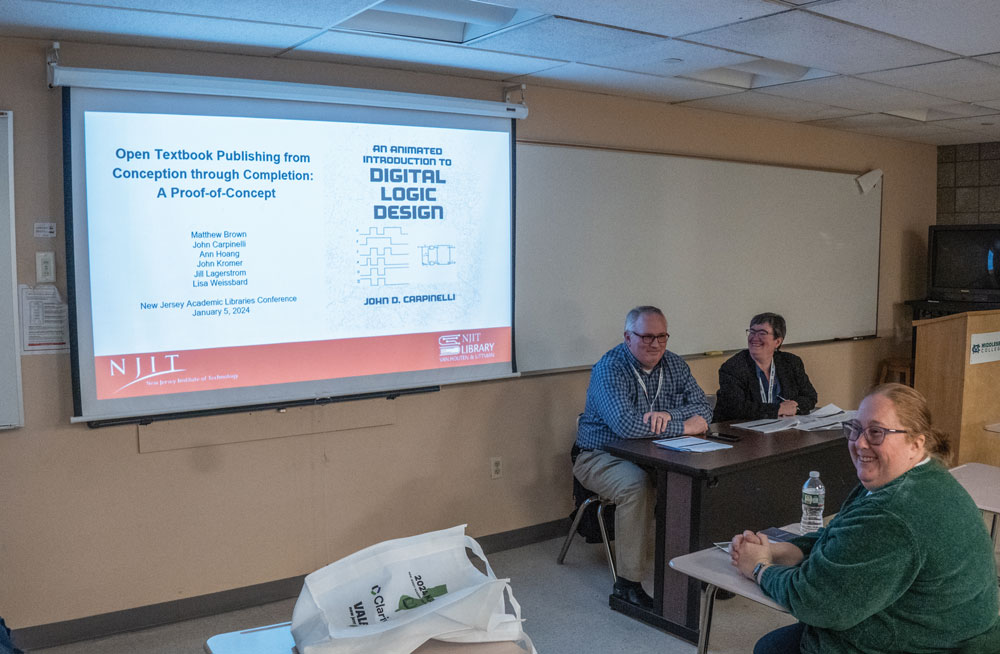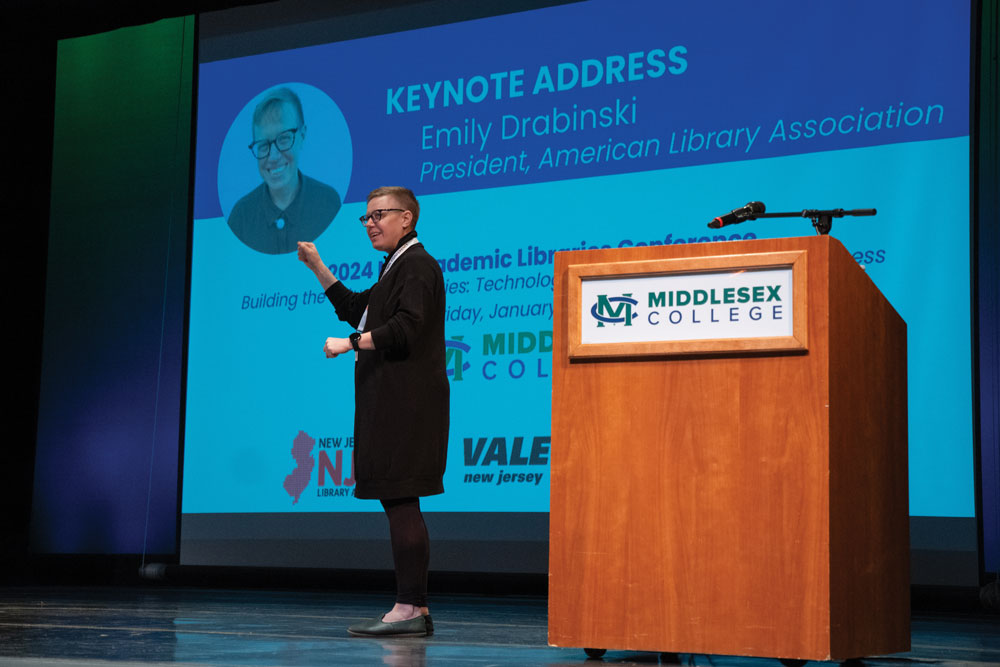With a longtime love of reading since young adulthood, Ann D. Hoang began working in a library as a student employee at Rutgers University. Her experience there helped direct her career path and she knew right away that she wanted to stay in academia and academic librarianship. “Being able to meet other students and having the ability to work with faculty and support students was very fulfilling,” says Hoang, University Librarian at New Jersey Institute of Technology (NJIT); Chair, VALE Executive Committee. “My first full-time job was at Rutgers as a Reference & Materials Delivery Coordinator. This role was within the IT department and gave me the opportunity to learn more about computing. This included using the iMac when it was first released and loading CD-ROMs onto servers. I realized I could combine my love of reading and supporting students and faculty with an interest in expanding my knowledge of technology.”
Gaining valuable experience in project management, Hoang quickly moved up the ranks, and in 2006, was recruited by NJIT to join their team as the Assistant University Librarian. In this role she served as the chief information officer for library technology overseeing administrative, library information technology, and collections services. “During the eleven years in this position, I was able to further hone my project management capabilities and technology knowledge,” shares Hoang. “When the head of the library position opened at NJIT, I applied and following a rigorous nationwide search, was awarded the position, and I’ve now been in this role for seven years. Even though I’m in a strategic leadership position, I still love meeting with students and helping them find the resources they need.”
Navigating the road to her current role at NJIT wasn’t easy. Reflecting back on her early, formative years, Hoang describes, “My family left Vietnam in 1978 as political refugees. We had to flee the country by boat. We were known as the “Boat People” because of how we left Vietnam. After many months of wandering the ocean, we finally arrived in Hong Kong. We spent two years in refugee camps waiting to settle in the United States. We arrived in New Jersey on a cold September evening in 1980 without speaking English.” She continues, “I remember it was so dark, thinking about how I would live here when everything was big and dark. Reading kept me focused while learning English. I spent many hours and days in ESL (English as a second language) classes. It took several years to understand the language with support from teachers and students of similar backgrounds. This part of my life helped me appreciate why engaging and supporting students is essential.”
“Many times, students are writing research papers and need to choose the right keywords to use when searching for resources,” continues Hoang. “I like being able to break down the process and instruct them on the steps needed to find information, as well as explain the difference between peer review content and block quotes off the Web. My team continually gathers feedback on how we can better support students and faculty. A large part of this is providing off-campus access to resources, anytime, anywhere. The library has evolved far past a quiet space full of books; the underlying infrastructure is now about technology and facilitating seamless access to much-needed content.”
“Professional development will give library staff new skill sets and make sure we’re on par with understanding our faculty’s needs and how to integrate technology successfully. This includes using certain tools like artificial intelligence (AI) and virtual reality and how to provide data management services. To support students, we also have an opportunity to partner with faculty to develop freely available content that is implemented within their curriculum. Since textbooks are often not affordable for many students, this solution could give free access to materials and help students be more successful in their coursework.”
— Ann D. Hoang
University Librarian New Jersey Institute of Technology (NJIT);
Chair, VALE Executive Committee

The New Age of Academic Libraries
In the past, traditional libraries focused on collecting physical print items, but as we entered the digital age, open access to resources became paramount. “The biggest challenge for us is providing instant access to our collection,” explains Hoang. “The only way to address this need is converting print to electronic, which is very time-consuming. And while vendors have designed a way to create digitally native content, this service can be costly. We can create a vicious cycle where faculty write grants to conduct research and pay to publish the research, followed by the libraries paying to acquire access to that research. We end up double or triple paying for the same content. To remain valuable to the institution, we must determine how to continuously provide access to that digital collection, including special collections.”
Digitizing a library’s special collections is necessary, but a labor-intensive process. “Much of the older content is not available digitally and we must determine how content that was created in the 1700s and 1800s, for example, can be converted into a primary source for users to access digitally,” says Hoang. “This is an important challenge and institutions need staff with the technical skills to complete these tasks, along with the technology infrastructure. Partnering with our IT department is crucial to understanding our limitations and ensuring our content is protected behind the firewall, so our institution’s network is not compromised. Libraries are being tasked with understanding technology and how to use these tools to facilitate and simplify our work.”
In addition to harnessing technology in useful ways, many libraries also seek to gain insights about their users and how their resources are being used. “Traditionally, libraries do not collect data, but it would be helpful to understand who is using each resource, and particularly, the number of students and faculty,” says Hoang. “This information could help determine if the resource is worth being part of our collection. We must learn how to collect data, as well as helping our faculty collect that data as they conduct their research and build large data sets. Additionally, we must determine how the faculty can collect, store, and share their data set. The library is in a perfect position to develop a data management service to help our faculty follow best practices for storing data and putting it in a format that allows other researchers to access it easily.”
For library staff to support data management, training will be an important part of achieving this goal. “Professional development will give library staff new skill sets and make sure we’re on par with understanding our faculty’s needs and how to integrate technology successfully,” explains Hoang. “This includes using certain tools like artificial intelligence (AI) and virtual reality and how to provide data management services. To support students, we also have an opportunity to partner with faculty to develop freely available content that is implemented within their curriculum. Since textbooks are often not affordable for many students, this solution could give free access to materials and help students be more successful in their coursework.”
“VALE serves as an incredible resource for higher education libraries across New Jersey, providing thought leadership, consortium buying of subscription databases, professional development events, and more. Edge is sincerely pleased and honored to work with Ann and the VALE organization to support their business organization needs. Moreover, Ann’s leadership of VALE and in her role as University Librarianat NJIT, a rapidly evolving Research 1 institution, uniquely position her to represent the achievements of institutional libraries across the State.”
— Sam S. Conn, Ph.D.
President and Chief Executive Officer, Edge

Expanding Information Literacy
As AI continues to transform the higher education landscape, the use of generative AI tools is on the rise. According to Inside Higher Education, 9 percent of faculty members had used AI writing tools in the spring of 2023, but that rate had risen to 22 percent by the fall. The adoption rate was even higher among students, where the rate jumped from 27 percent in the spring to 49 percent in the fall.1 “The emergence of AI presents both challenges and opportunities,” says Hoang. “Using AI positively can lead to many innovations, however using it negatively can be a detriment to society, so educating students and faculty on the ethical use of AI will be essential. We also need to explore how AI can enhance our data collecting and decision making. This technology can help us synthesize large sets of data and augment the decision-making process; allowing us to solve problems more creatively.”
“Navigating the ethical issues surrounding AI is critical and we must ease the fear that robots are going to take over our jobs,” continues Hoang. “Because in theory, if we use AI properly, this technology can help us synthesize information and increase our skills, allowing us to be one step ahead of the AI tool. Therefore, we become a valuable component of our institutions and can use advanced tools to make informed decisions. We must continue to expand our knowledge of AI and its capabilities to not only be prepared to seize important opportunities, but also to identify solutions that can combat the misuse of this technology.”
To introduce students to available AI tools, librarians at NJIT have regular information sessions and conduct demonstrations to show how AI can answer different questions. “We will compare the information provided by AI to the information we look up manually,” explains Hoang. “Sometimes AI can give the wrong answer, so if we just accept that information, we could potentially create something that is false or a societal detriment. Students must understand how to validate information and avoid plagiarizing someone else’s work. The library’s role is to educate students on the use of AI, while also helping them stay versed in finding information manually, using the search engine, and using our subscription to library resources to find what they need. We want to help them understand how to find the government regulations and rules set forth by an institution surrounding AI and ways to avoid violation of regulatory guidelines.”
A key part of the librarian’s role is helping expand students’ information literacy and their ability to locate and evaluate specific information. “The need for information literacy has exploded with the use of AI,” says Hoang. “Librarians must continue to be at the forefront of changing trends and technologies to teach students the correct way to look up information and verify that the information is accurate before continuing. That component seems to be the missing link with the newer generations because many students feel the Internet is the ultimate resource. Our faculty members partner with librarians and allow us to share this knowledge in the classroom and explain the rationale behind verifying information.”
Supporting Faculty Research
Research continues to be a top priority in NJIT’s strategic plan. In 2022, the institution was reaffirmed as an elite research university and retained its R1 status by Carnegie Classification. “Our faculty is committed to expanding our research initiatives and pursuing grant funding to drive further innovation and discovery,” says Hoang. “To help in this endeavor, the library must ensure we have the infrastructure to support the research output of our faculty. As more research is conducted, the higher the need to store and preserve data. I am currently recruiting an open access and scholarly communications librarian with the skills to support open access and data management services. I also look to expand our team with individuals who have computer science technology, data science, and information technology backgrounds and can support our faculty in their research projects.”
“With librarians involved in supporting faculty research, we can help ensure information is documented properly and they are compliant with copyright laws,” continues Hoang. “We also can help identify possible collaborative partnerships and conduct background research on which journals would be the best match for publishing their work. We can identify which authors have the highest rating or citation impact on their research and connect our faculty with other institutions on a national and global scale. The library is poised to provide valuable insight into how our faculty can expand the reach of their research and find collaborators around the world.”
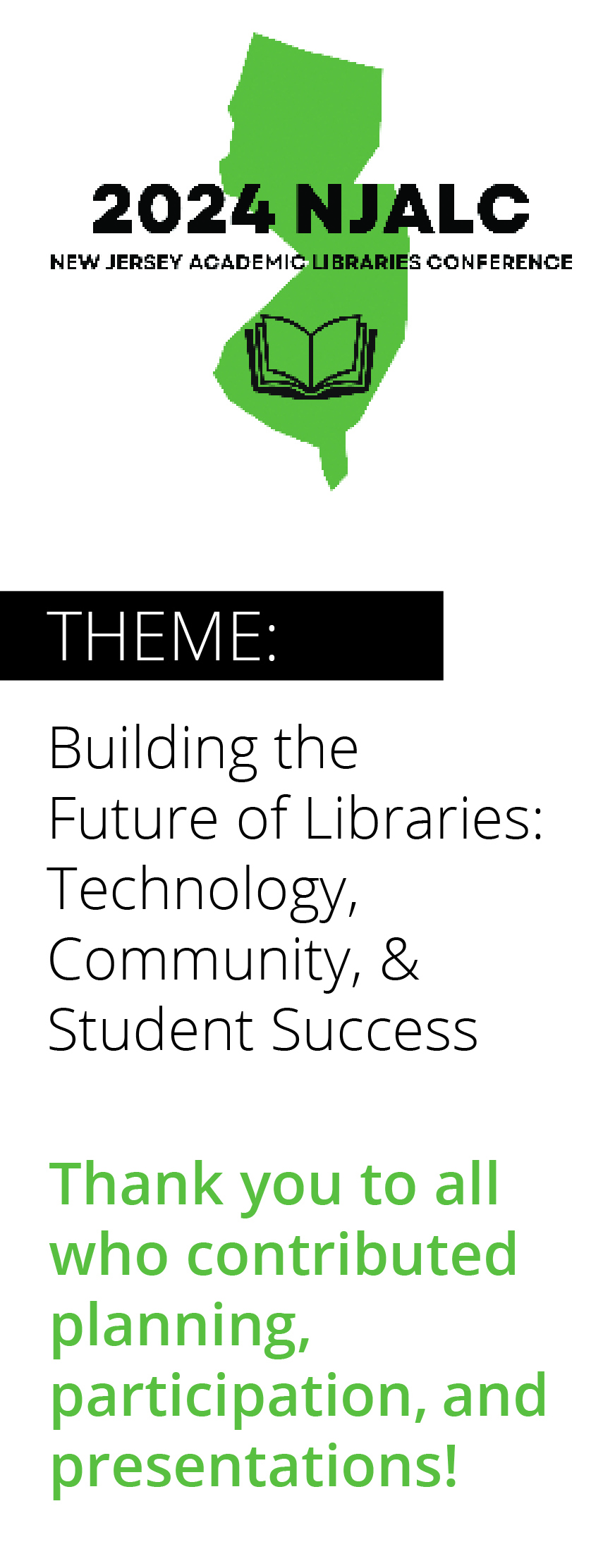
Facilitating Collaboration
The Virtual Academic Library Environment (VALE) is a consortium of fifty New Jersey college and university libraries, the New Jersey State Library, and LibraryLinkNJ (LLNJ). “The primary focus of VALE is offering a cooperative purchasing agent, similar to EdgeMarket,” says Hoang. “They negotiate a licensing contract with different vendors so libraries can purchase through the consortium without having to negotiate back and forth with the vendor. I was on VALE’s website committee early in my career to help develop websites that provided researchers with easy access to necessary resources, both virtually and in person.”
Currently serving as VALE Chair, Hoang and the Executive Committee discuss recommendations for purchasing databases, hardware, and software, and how libraries can meet the evolving needs of the academic community. “We are currently exploring how we can continue to integrate technology tools and ensure our librarians are equipped with necessary skills,” shares Hoang. “The Committee is looking at digital transformation, open access, publications, scholarships, and how we can house special collections that can be shared across academic institutions in New Jersey. We are exploring how we can work collectively to create a centralized, statewide repository that houses this content and can be accessed free of cost, anytime, anywhere.”
VALE hosts a conference on the first Friday of January to bring academic librarians from throughout the region together to discuss current topics, technology, and strategies for supporting student success. Along with John Kromer, Matthew Brown, Jill Lagerstrom, and Lisa Weissbard, the NJIT Librarians presented at a breakout session at VALE’s 2024 New Jersey Academic Libraries Conference on January 5, 2024. Entitled, Open Textbook Publishing from Conception through Completion: A Proof-of Concept, this session explored their multi-year journey of publishing their first open textbook, An Animated Introduction to Digital Logic Design, by NJIT professor John Carpinelli. They shared details about securing and apportioning funding, collaborating with a faculty author, compiling and editing the book, determining requisite technology, publishing in an open repository, tracking usage, and the plans for the future.
Events like VALE’s annual conference provide valuable networking opportunities and a chance for librarians and the VALE team to prepare for their presentations at national and international conferences. “The VALE conference acts as a starting point or test where and presenters are able to gather feedback on how to improve their presentations and be better prepared for a wider audience,” says Hoang. “Through our partnership with Edge, we are now soliciting sponsorships to supplement the conference to help us continue to provide the event to librarians free of charge.”
A Vision for the Future
As we look toward the future of libraries, Hoang says the biggest challenge will be to keep pace with advanced technology like AI. “We’re just starting to scratch the surface of understanding the impact AI will have on our day-to-day lives. If we fail to keep up with learning more about these technologies and developing programming around AI, we risk missing out on key opportunities. We must also embrace digital transformation and determine how to provide seamless access to resources; otherwise, we lose our value, and our students and faculty will turn to someone else for that information. In addition, libraries need collaborative flexible spaces for our students to learn and we must find innovative ways to support different learning styles, whether that is quiet study or spaces for louder, more active collaboration.”
“Libraries play a vital role in enhancing students’ learning capabilities and will need to provide interactive technologies and tools that students can use to apply what they learn in the classroom,” continues Hoang. “All these goals require thoughtful planning, strategic thinking, network infrastructure, and professional development. The library is integral to institutional success and we must raise awareness about its importance. Traditionally, librarian positions are greatly underpaid. Yet in today’s world, these individuals are expected to have advanced education and skills equal to someone in IT or computer science. I feel that by contributing to VALE, I am supporting my profession and community and helping my institution excel in the 21st century.”


